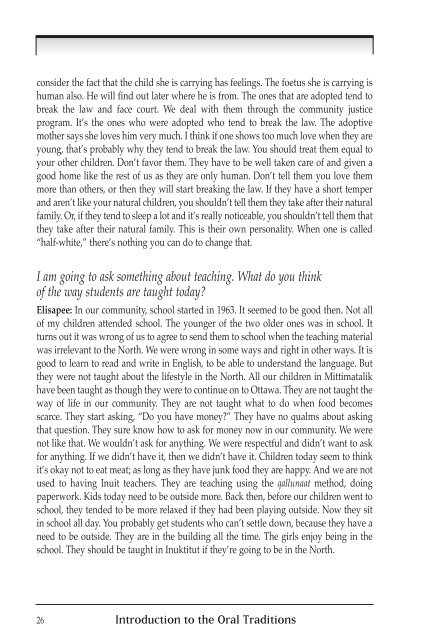Introduction-E
Introduction-E
Introduction-E
You also want an ePaper? Increase the reach of your titles
YUMPU automatically turns print PDFs into web optimized ePapers that Google loves.
consider the fact that the child she is carrying has feelings. The foetus she is carrying is<br />
human also. He will find out later where he is from. The ones that are adopted tend to<br />
break the law and face court. We deal with them through the community justice<br />
program. It’s the ones who were adopted who tend to break the law. The adoptive<br />
mother says she loves him very much. I think if one shows too much love when they are<br />
young, that’s probably why they tend to break the law. You should treat them equal to<br />
your other children. Don’t favor them. They have to be well taken care of and given a<br />
good home like the rest of us as they are only human. Don’t tell them you love them<br />
more than others, or then they will start breaking the law. If they have a short temper<br />
and aren’t like your natural children, you shouldn’t tell them they take after their natural<br />
family. Or, if they tend to sleep a lot and it’s really noticeable, you shouldn’t tell them that<br />
they take after their natural family. This is their own personality. When one is called<br />
“half-white,” there’s nothing you can do to change that.<br />
I am going to ask something about teaching. What do you think<br />
of the way students are taught today?<br />
Elisapee: In our community, school started in 1963. It seemed to be good then. Not all<br />
of my children attended school. The younger of the two older ones was in school. It<br />
turns out it was wrong of us to agree to send them to school when the teaching material<br />
was irrelevant to the North. We were wrong in some ways and right in other ways. It is<br />
good to learn to read and write in English, to be able to understand the language. But<br />
they were not taught about the lifestyle in the North. All our children in Mittimatalik<br />
have been taught as though they were to continue on to Ottawa. They are not taught the<br />
way of life in our community. They are not taught what to do when food becomes<br />
scarce. They start asking, “Do you have money?” They have no qualms about asking<br />
that question. They sure know how to ask for money now in our community. We were<br />
not like that. We wouldn’t ask for anything. We were respectful and didn’t want to ask<br />
for anything. If we didn’t have it, then we didn’t have it. Children today seem to think<br />
it’s okay not to eat meat; as long as they have junk food they are happy. And we are not<br />
used to having Inuit teachers. They are teaching using the qallunaat method, doing<br />
paperwork. Kids today need to be outside more. Back then, before our children went to<br />
school, they tended to be more relaxed if they had been playing outside. Now they sit<br />
in school all day. You probably get students who can’t settle down, because they have a<br />
need to be outside. They are in the building all the time. The girls enjoy being in the<br />
school. They should be taught in Inuktitut if they’re going to be in the North.<br />
26 <strong>Introduction</strong> to the Oral Traditions


